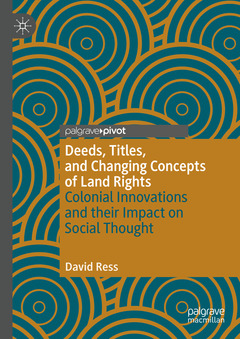Description
Deeds, Titles, and Changing Concepts of Land Rights, 1st ed. 2020
Colonial Innovations and Their Impact on Social Thought
Author: Ress David
Language: English
Subjects for Deeds, Titles, and Changing Concepts of Land Rights:
115 p. · 14.8x21 cm · Hardback
Description
/li>Contents
/li>Biography
/li>Comment
/li>
This book explores the history of public land tenure records, which first began in colonial Massachusetts as English settlers and Native Americans tried to resolve differing ideas about rights to land in the seventeenth century. In South Australia, a similar method of state certification of land ownership arose in the nineteenth century, through Torrens system title registration ? a process that would be widely adopted in British and American colonies as a particularly effective way of guaranteeing absolute ('fee simple') ownership over indigenous peoples? land. This book explores the similarities between these two record systems, highlighting how similar settlement patterns and religious beliefs in both places focused attention on recording land tenure, and illustrating how these record systems encouraged new ways of thinking about rights to and on land.
Chapter 1. Introduction: Mr. Rowle Tries to Secure His Land.- Chapter 2. Massachusetts: Going to the Court House.- Chapter 3. Working It Out In Writing: The Evolving Language of Land Deeds.- Chapter 4. South Australia: Registration and The Urge For Good Order.- Chapter 5. Registration and The Conflict of Land Tenure Concepts.- Chapter 6. Conclusion.
David Ress is an honorary research associate at the University of New England, Australia. He is the author of Municipal Accountability in the American Age of Reform (2018), and The Half Breed Tracts in Early National America (2019), both published by Palgrave Macmillan.
Explores the history of public land tenure records, which first emerged in colonial Massachusetts in the seventeenth century
Compares similar conditions in Massachusetts and nineteenth-century South Australia, where the Torrens system of title registration emerged
Illustrates how the development of record systems encouraged new ways of thinking about rights to land




